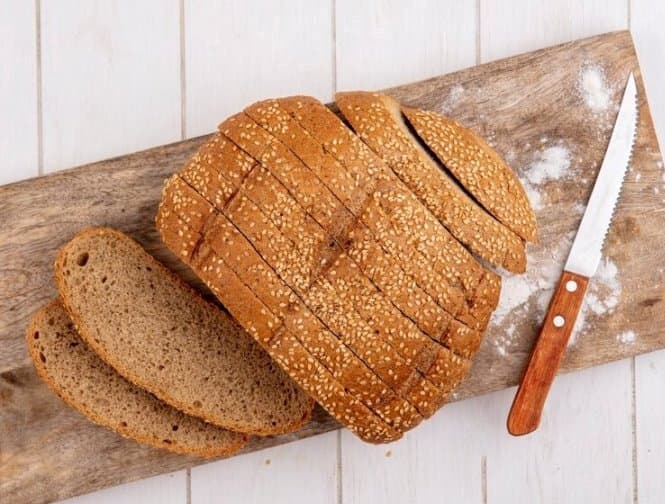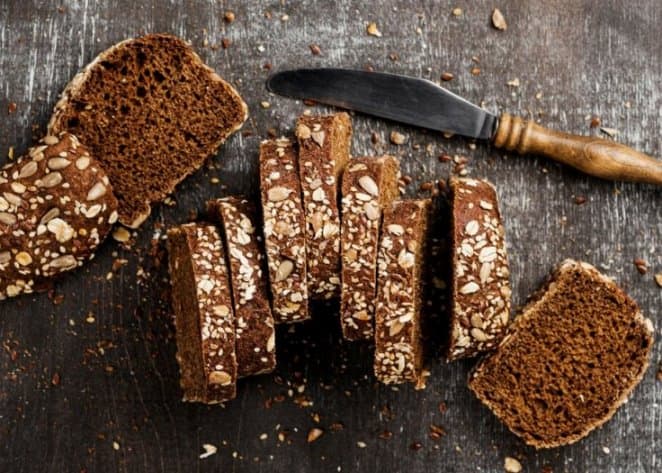What is a Good Substitute For Bread For Diabetics?
Diabetes management heavily revolves around controlling blood sugar levels, which often means making dietary adjustments. Bread, a common staple food, is packed with carbohydrates that can spike blood sugar.
Fortunately, there are plenty of substitutes that are lower in carbohydrates and healthier for individuals with diabetes. We look at several bread substitutes in this post so you may still enjoy your food without worrying about raising your blood sugar levels.
Table of Contents
Why Bread Can Be Problematic for Diabetics?
Traditional bread, especially white or refined grain varieties, is high in carbohydrates and has a high glycemic index (GI). The rate at which a food elevates blood sugar levels is measured by the glycemic index.
Foods with a high GI, like white bread, are rapidly absorbed and lead to sharp increases in blood glucose levels. This can make it difficult for people with diabetes to maintain stable blood sugar levels, which is crucial for preventing complications related to the condition.
In addition, many commercial breads contain added sugars and unhealthy fats, which can further exacerbate health issues for diabetics. Therefore, finding bread substitutes that are low in carbohydrates, high in fiber, and nutrient-dense is a great way to enjoy meals without the adverse impact on blood sugar.
Best Bread Substitutes for Diabetics
For people with diabetes, it’s important to manage blood sugar levels, and bread, especially white or refined bread, can cause spikes in blood sugar due to its high carbohydrate content. Fortunately, there are several healthier alternatives to bread that are better suited for managing diabetes:
Cloud Bread – A Low-Carb, Gluten-Free Option
Cloud bread is an excellent substitute for traditional bread, particularly for people with diabetes. Made with just three ingredients – eggs, cream cheese, and cream of tartar – cloud bread is extremely low in carbohydrates and does not spike blood sugar levels.
Plus, it’s gluten-free, making it suitable for those with gluten sensitivities.
Lettuce Wraps – A Fresh, Crispy Alternative
One of the simplest and healthiest substitutes for bread is using lettuce wraps. Large leaves of romaine, iceberg, or butter lettuce can hold ingredients much like a traditional sandwich.
Lettuce contains almost no carbohydrates and is low in calories, making it an ideal substitute for bread. In addition, lettuce provides a good source of fiber, which helps in slowing down the absorption of glucose, aiding in better blood sugar control.
How to Use Lettuce Wraps
- Use lettuce wraps for burgers, sandwiches, and wraps.
- Fill with lean proteins like turkey, chicken, or plant-based proteins for a balanced meal.
Read Also: Myths And Truths About Diabetes
Almond Flour Bread – A Nutty, Low-Carb Substitute
Almond flour bread is an excellent low-carb alternative to traditional bread. Almond flour is made from ground almonds and contains significantly fewer carbohydrates than wheat flour.
It is also high in healthy fats, fiber, and protein, which helps keep you fuller for longer and prevents blood sugar spikes. The low glycemic index of almonds makes this a great option for people with diabetes.
How to Use Almond Flour Bread
- Use almond flour to make low-carb bread for sandwiches or toast.
- You can find pre-made almond flour bread in health food stores or make your own at home with almond flour, eggs, and baking powder.
Coconut Flour Bread – Low-Carb and High Fiber
Coconut flour is another great option for making bread substitutes. Coconut flour is low in carbohydrates but high in fiber, making it suitable for people with diabetes.
It also has a mild, slightly sweet taste that pairs well with both savory and sweet dishes. Coconut flour is highly absorbent, so it’s typically used in smaller quantities compared to regular flour, and it provides a filling, satisfying texture.
How to Use
- You can use coconut flour to make bread, muffins, or flatbreads.
- Combine with eggs and a small amount of oil to create a dough for low-carb, diabetes-friendly bread.
Cauliflower Bread – A Nutrient-Rich, Low-Carb Option
Cauliflower is a versatile vegetable, often used as a low-carb substitute for many traditional foods. Cauliflower bread is made by blending cauliflower with eggs and cheese, creating a tasty and nutritious alternative to regular bread.
Since cauliflower is low in carbs and calories, it’s perfect for diabetics who want to maintain their blood sugar levels.
Why Cauliflower Bread Works:
- Low in carbohydrates and calories.
- Rich in vitamins C and K, as well as antioxidants.
- Easy to make and adaptable for various recipes.
Flaxseed Bread – A Fiber-Rich, Omega-3 Powerhouse
Flaxseed bread is another excellent option for diabetics, as it is packed with fiber and omega-3 fatty acids. These essential nutrients help improve heart health and stabilize blood sugar levels.
Flaxseeds are also low in carbs, making this bread an ideal substitute for traditional wheat-based bread.
Benefits of Flaxseed Bread
- High fiber content aids in blood sugar control.
- Rich in omega-3 fatty acids for better heart health.
- Low in carbohydrates and gluten-free.
Check Also: What causes the excess carbohydrates?
Chia Seed Bread – A Nutrient-Dense, Low-Carb Choice
Chia seeds are rich in omega-3 fatty acids, fiber, and antioxidants, making them a superfood for those managing diabetes. Chia seed wraps or flatbreads are low in carbs and provide a great source of dietary fiber, which helps slow digestion and prevent blood sugar spikes.
The high fiber content also helps keep you feeling full longer, which can aid in weight management — an important factor for many people with diabetes.
How to Use
- Mix chia seeds with water and let them thicken to form a dough, then bake or dehydrate into flatbreads.
- Use chia seed wraps as a base for sandwiches, tacos, or wraps.
Ezekiel Bread – A Sprouted Grain Alternative
Ezekiel bread is made from sprouted whole grains and legumes, offering a healthier alternative to traditional bread. Although it still contains carbohydrates, the sprouting process lowers its glycemic index, meaning it has less impact on blood sugar levels compared to regular bread.
Advantages of Ezekiel Bread
- Lower glycemic index than regular bread.
- High in protein, fiber, and essential nutrients.
- A nutritious option for those who prefer sprouted grains.
Conclusion
Finding the right bread substitutes for diabetics doesn’t have to be difficult. By opting for low-carb, high-fiber alternatives like lettuce wraps, almond flour bread, or chia seed wraps, people with diabetes can enjoy delicious meals without compromising their health.
Incorporating these substitutes into a balanced diet helps improve blood sugar management and reduces the risk of complications associated with diabetes.

